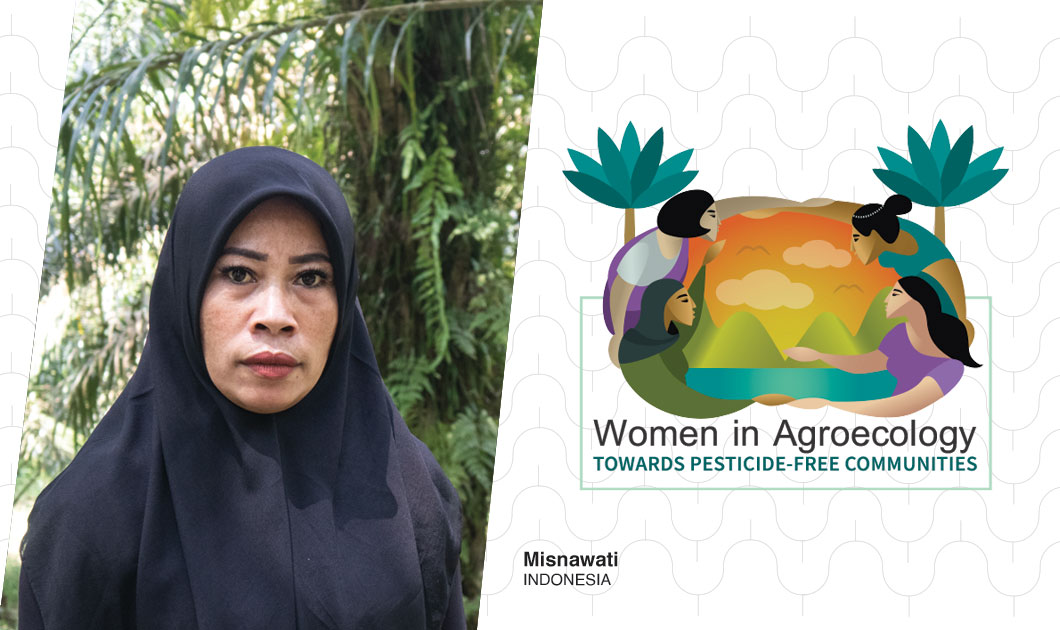In the heart of Simpang Belutu, nestled within Kandis, Riau, Indonesia, lies the story of Misnawati, a 45-year-old Sakai woman and the leader of Serikat Perempuan Indonesia (SERUNI). Her journey from pesticide poisoning survivor to advocate of agroecology is a testament to resilience and determination in the face of adversity.
Misnawati tills a modest plot of land, approximately 1000 . She cultivates cassava as her primary crop. However, her agricultural endeavours are set against a backdrop of complex land dynamics, deeply intertwined with the legacy of imperialism and the exploitation of natural resources by powerful corporations.
The Eka Tjipta Widjaja family, the most dominant landlord in Indonesia today, controls extensive land holdings through entities like Golden Agri Resources (GAR) and Sinar Mas Forestry SMF). In Kandis District, Siak Regency, PT Ivomas Tunggal Perkasa, a subsidiary of GAR, oversees 31,000 hectares of land once inhabited by the Sakai Minority Tribe, now converted into oil palm plantations. This area is where the land that Misnawati tends lies. The once-thriving ecosystem was transformed into vast monoculture plantations, leaving indigenous communities displaced and marginalized.
These plantations, organized into seven estates, employ over 5,000 workers under harsh conditions, with barracks housing for families. Additionally, Ivomas Tunggal operates three processing factories, further consolidating its control over the region’s economy. Despite the vast wealth generated, the local community faces economic, political, and cultural stagnation, perpetuating a cycle of labour exploitation and limited opportunities for livelihood diversification.
Pesticide Poisoning Survivor to Beacon of Hope
Misnawati’s introduction to agriculture came through her employment with PT Ivomas Tunggal Perkasa, where she worked as a contractual labourer for three years. In her role, she was frequently exposed to chemical pesticides, particularly Glyphosate, commonly known as Round-Up. She was in charge of spraying the said pesticide daily, for one week every month. Regular exposure to these toxic chemicals took a toll on her health. It manifested in symptoms such as shortness of breath, itching, and allergies.
The adverse effects of pesticide exposure threatened her health and disrupted her ability to work effectively. The toll on her well-being was undeniable despite the medical treatment that she received within the plantation. After experiencing this, she resolved to abandon chemical farming practices. She then began advocating for safer alternatives for herself and her community.
Misnawati leaned towards agroecology, driven by a desire for health and environmental sustainability. She drew wisdom from traditional knowledge passed down through generations and embraced organic farming practices.
Her agroecological practices prioritize pest and disease management through organic means, fostering soil fertility, and promoting crop diversity. Misnawati chose cassava as her staple crop due to its resilience and nutritional value.
Through her advocacy with SERUNI, Misnawati empowers women to reclaim control over their land and resources. Agroecology has become a tool for women’s economic empowerment. It provides them with income-generating opportunities while fostering community resilience.
Furthermore, despite the challenges posed by the transition from chemical agriculture, Misnawati remains steadfast in her commitment to agroecology. She hopes for a future where farmers, especially women, can practice sustainable farming practices, free from corporate dominance.
Misnawati’s journey encapsulates the revolutionary power of agroecology in empowering marginalized communities and safeguarding their health and well-being. Her story inspires others to reclaim their land, cultivate biodiversity, and forge a path toward a more equitable and sustainable future.
As she continues to sow the seeds of change, her advocacy reaches far beyond the boundaries of her village. From being a pesticide poisoning survivor, she now plays an integral part in the movement for agroecological justice and food sovereignty across Indonesia and beyond.###
Women In Agroecology: Towards Pesticide-Free Communities is a continuing storytelling initiative of PAN Asia Pacific and its partners to document stories of rural women who are survivors of pesticide poisoning and/or making the transition to agroecology.
Our contributing partners for the second installation: Shikkha Shastha Unnayan Karzakram (SHISUK), Bangladesh; Serikat Perempuan Indonesia (SERUNI); Sustainable Agriculture and Environment Development Association (SAEDA), Laos; and Research Centre for Gender, Family and Environment in Development (CGFED), Vietnam








Discussion about this post